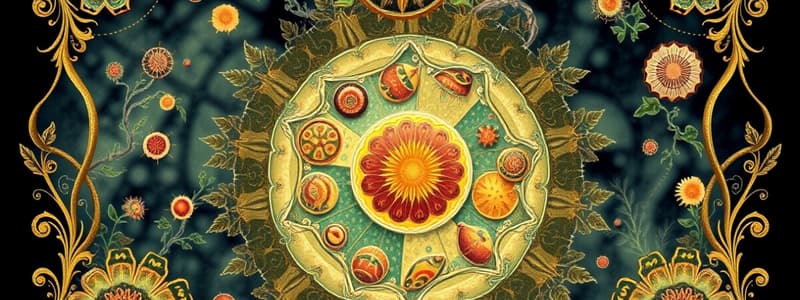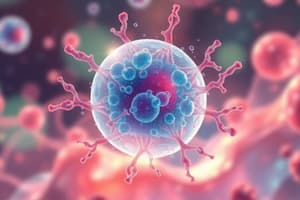Podcast
Questions and Answers
Who was the scientist that observed cork cells under a microscope, contributing to cell theory?
Who was the scientist that observed cork cells under a microscope, contributing to cell theory?
- Matthias Schleiden
- Anton van Leeuwenhoek
- Robert Hooke (correct)
- Francesco Redi
Which scientist proposed that all plants are composed of cells?
Which scientist proposed that all plants are composed of cells?
- Matthias Schleiden (correct)
- Louis Pasteur
- Theodor Schwann
- Rudolf Virchow
What was Francesco Redi's contribution to the development of the cell theory?
What was Francesco Redi's contribution to the development of the cell theory?
- He devised the first microscope.
- He disproved the spontaneous generation theory. (correct)
- He proposed that all cells come from pre-existing cells.
- He observed microorganisms in pond water.
Who is credited with the observation of microorganisms using a practical microscope?
Who is credited with the observation of microorganisms using a practical microscope?
Which principle states that every living organism is composed of one or more cells?
Which principle states that every living organism is composed of one or more cells?
What did Rudolf Virchow propose in relation to cell theory?
What did Rudolf Virchow propose in relation to cell theory?
Which two scientists are considered key figures in medical microbiology and established the germ theory of disease?
Which two scientists are considered key figures in medical microbiology and established the germ theory of disease?
What concept did Theodor Schwann propose regarding animals?
What concept did Theodor Schwann propose regarding animals?
Who invented the first primitive microscope?
Who invented the first primitive microscope?
What era did Zacharias Janssen contribute to the development of cell theory?
What era did Zacharias Janssen contribute to the development of cell theory?
Which of the following was NOT a factor in the development of cell theory?
Which of the following was NOT a factor in the development of cell theory?
What was the primary purpose of the microscope invented by Janssen?
What was the primary purpose of the microscope invented by Janssen?
Which scientist is known for detailed observations of living cells using a microscope?
Which scientist is known for detailed observations of living cells using a microscope?
What significant contribution did scientists make to the development of cell theory?
What significant contribution did scientists make to the development of cell theory?
Which of the following concepts is central to cell theory?
Which of the following concepts is central to cell theory?
Why was the development of cell theory significant in biology?
Why was the development of cell theory significant in biology?
Who was the first scientist to observe cells under a microscope?
Who was the first scientist to observe cells under a microscope?
Which scientist’s experiment disproved the spontaneous generation theory?
Which scientist’s experiment disproved the spontaneous generation theory?
Who proposed that the cell is the basic unit of plants?
Who proposed that the cell is the basic unit of plants?
Which scientist is credited with the concept that cells come from pre-existing cells?
Which scientist is credited with the concept that cells come from pre-existing cells?
Which pair of scientists pioneered the ‘germ theory’?
Which pair of scientists pioneered the ‘germ theory’?
Which scientist proposed that the cell is the basic unit of animals?
Which scientist proposed that the cell is the basic unit of animals?
Which scientist is known for their work related to plant and animal cell structure?
Which scientist is known for their work related to plant and animal cell structure?
What major principle is attributed to Rudolf Virchow in the context of cell theory?
What major principle is attributed to Rudolf Virchow in the context of cell theory?
Flashcards are hidden until you start studying
Study Notes
Contributors to Cell Theory
- Robert Hooke (1635–1703) was the first to observe cells in cork using a microscope.
- Francesco Redi (1626–1697) conducted experiments that disproved the spontaneous generation theory.
- Anton van Leeuwenhoek (1632–1723) used a practical microscope to observe microorganisms, marking a significant advancement in microbiology.
- Matthias Schleiden (1804–1881) proposed that all plants are composed of cells.
- Theodor Schwann (1810–1882) asserted that all animals are made up of cells.
- Rudolf Virchow (1821–1902) stated that all cells come from pre-existing cells.
- Louis Pasteur (1822–1895) and Robert Koch (1843–1910) made significant contributions to medical microbiology and supported the germ theory of disease.
- Zacharias Janssen (1585–1632) invented the first primitive microscope, enabling cell observation.
Principles of Cell Theory
- Principle 1: All living organisms consist of one or more cells, which can be unicellular or multicellular, reflecting different complexity levels.
- Principle 2: The cell is the fundamental unit of life, serving as the smallest structural and functional unit in all organisms.
- Principle 3: Cells arise from pre-existing cells, containing hereditary material passed during cell division.
- Principle 4: Hereditary information is transferred from cell to cell during division.
- Principle 5: Energy flow occurs within cells, which is essential for their functions.
- Principle 6: All cells share a similar composition, emphasizing common biochemical traits.
General Functions of Cells
- Cells regulate their internal environment to maintain homeostasis, essential for functioning.
- They acquire and utilize energy for various functions, such as heart cells pumping blood and intestinal cells aiding in digestion.
- Cells demonstrate responsiveness to their environment, vital for survival and adaptation.
- Protection and support mechanisms include tanned skin providing UV protection and immune cells defending against pathogens.
- The high surface area to volume ratio in cells ensures efficient nutrient absorption and waste removal.
Practical Application in Healthcare
- Effective sterilization and disinfection practices stem from principles of cell theory, particularly concerning germ theory and the understanding of microbial life.
Studying That Suits You
Use AI to generate personalized quizzes and flashcards to suit your learning preferences.




